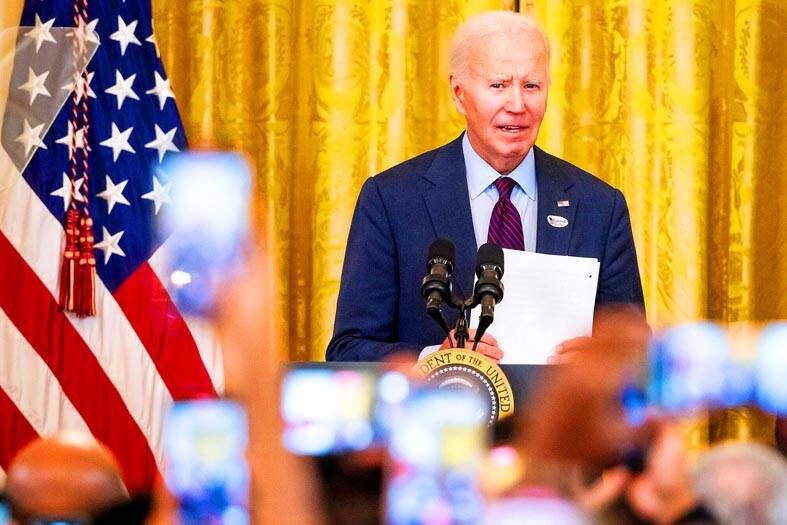HANDOVER POLICY:
Approving the probe means that the new US administration of Donald Trump is likely to have the option to impose trade restrictions on China
US President Joe Biden’s administration is set to initiate a trade investigation into Chinese semiconductors in the coming days as part of a push to reduce reliance on a technology that US officials believe poses national security risks.
The probe could result in tariffs or other measures to restrict imports on older-model semiconductors and the products containing them, including medical devices, vehicles, smartphones and weaponry, people familiar with the matter said.
The investigation examining so-called foundational chips could take months to conclude, meaning that any reaction to the findings would be left to the discretion of US president-elect Donald Trump’s incoming team.

Photo: Bloomberg
Biden officials have for months debated whether to initiate the investigation under Section 301, which allows the US to impose restrictions on countries with unfair trade practices, the people said.
This week, White House officials agreed to move forward with the inquiry that could help protect the US chip industry.
Approving the probe now means that the new Trump administration would likely have the option to impose trade restrictions to protect domestic semiconductor production in the early months of the president-elect’s term.
Bolstering the US semiconductor industry has been a key focus for Biden, who has taken steps to limit advanced US technology from being exported to China.
Biden signed into law a bill that provided billions of dollars of incentives for chipmakers to build semiconductor factories in the US to stave off a need for cheaper Chinese-made chips.
Spokespeople for the US National Security Council and the US trade representative declined to comment.
The White House in the past two years has implemented export restrictions on advanced semiconductors made with US and allied technology, but in the meantime, China has manufactured the older, widely available types of semiconductors at a lower cost than its competitors.
Officials in the Biden administration worry that without restrictions, Beijing would flood the US and global markets with inexpensive chips, undercutting other companies and running them out of business.
In May, the White House announced that by next year it would increase tariffs on Chinese legacy semiconductors to 50 percent from 25 percent.
However, the Biden team largely agreed that was not enough to prevent a market disruption, especially as the US is looking to increase domestic production of semiconductors.
To impose those tariffs, Biden used the same authority Trump employed to levy more than US$300 billion in tariffs on Chinese goods during his first term.




